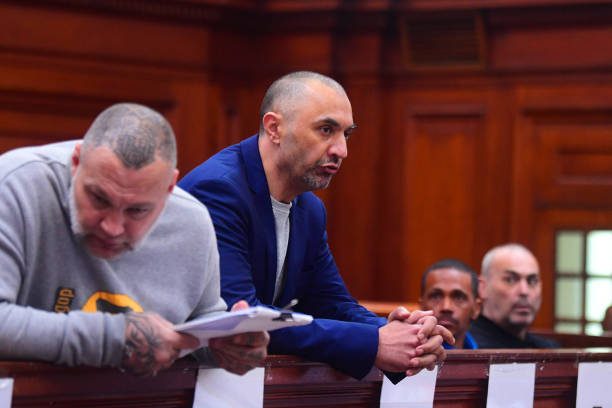The intricate and multi-million rand financial network allegedly orchestrated by Nafiz Modack, who is accused of being an underworld kingpin, has begun to unravel at the Western Cape High Court. The Hawks, South Africa’s elite crime-fighting unit, have raised significant doubts about the testimony of Modack’s purported financial operator, exposing potential inconsistencies in his defense.
On Monday, Captain Edward Du Plessis took to the witness stand once again, where he appeared unimpressed by the defense’s portrayal of the alleged invoices exchanged between Modack and his co-accused, Ricardo Morgan.
Just last week, Judge Robert Henney granted a postponement in the trial to allow Morgan time to produce invoices that could potentially clear his name in this extensive underworld case. The trial itself is closely tied to the murder of Charl Kinnear, a detective from the Anti-Gang Unit.
At the heart of the case are the multi-million rand transactions that passed through the Empire Investments bank account, which the state argues was used by Modack and his co-defendants to launder illicit funds. These funds were allegedly derived from extortion activities and were reportedly used to pay for the cellphone tracking services provided by Zane Killian.
Morgan, a childhood friend of Modack, was apprehended several years ago after reportedly attempting to evade Hawks officers who were investigating bank accounts associated with Empire Investments.
In court, Morgan’s attorney, Scanlyn Collins, contended that his client was involved in legitimate business activities. Collins stated that Morgan had rented out luxury vehicles owned by Modack to private clients and deposited the earnings into the Empire Investments account. Additionally, Collins claimed that during the Covid-19 pandemic, Morgan had entered into a business venture with Modack to sell protective gear, such as masks and sanitizers, due to the downturn in car sales and rentals.
However, Du Plessis cast serious doubt on these claims, accusing Morgan of having fabricated the invoices over the weekend to match the narrative presented by the Hawks.
“He could not have known what the credit reference was,”
Du Plessis pointed out, indicating the implausibility of Morgan’s explanation.
Judge Henney also raised concerns regarding the financial transactions reflected in the accounts, particularly noting the unusual pattern of only round totals appearing in the records.
Further scrutinizing the invoices, Du Plessis questioned their legitimacy, noting that they failed to comply with SARS (South African Revenue Service) standards and lacked detailed descriptions of the services or products being invoiced.
Morgan’s defense further weakened when he claimed to have made payments to Killian at Modack’s behest, though he insisted he was unaware of what these payments were for. This statement conflicted with earlier testimony from Killian, who had informed the court that Morgan had paid him for conducting cellphone pings on Kinnear’s phone, as well as others, including that of attorney William Booth.
“So everyone is just distancing themselves from the Empire account, but they have all confirmed that it was used by accused 1 [Modack],”
Du Plessis remarked, highlighting the attempts by those involved to minimize their connection to the controversial bank account.
The case against Modack and his co-accused continues to develop, with the court closely examining the financial transactions and relationships that lie at the heart of the allegations. As more evidence comes to light, the complexities of this alleged criminal network become increasingly apparent, leaving many questions about the true nature of the activities that were conducted under the guise of legitimate business dealings.

















